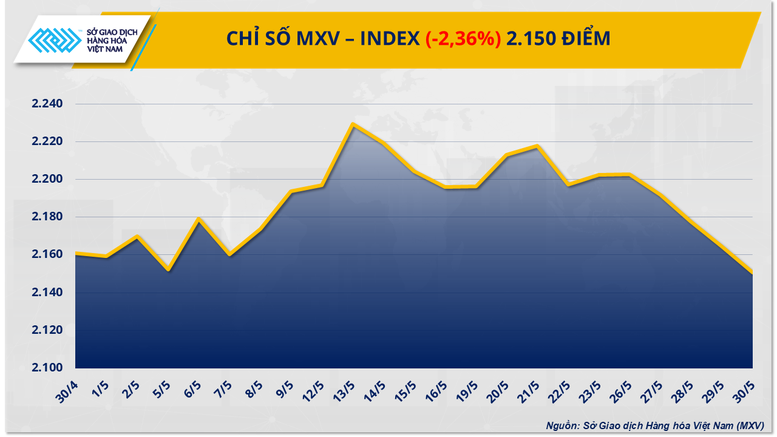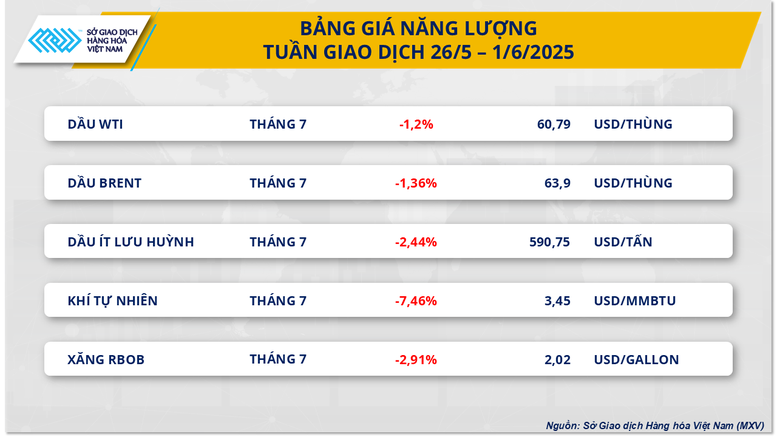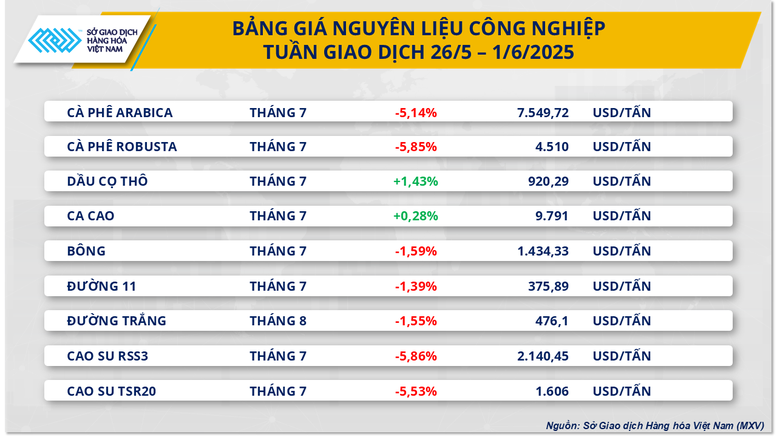
Oil prices extend decline into second week
According to MXV, all five energy commodities were in the red during the past trading week. The decline in oil prices due to market expectations of OPEC+ production decisions continued for the second consecutive week, despite new information about temporary supply disruptions.
At the end of the trading week, WTI oil prices fell 1.2% compared to the trading session on May 23, falling to 60.79 USD/barrel. Meanwhile, Brent oil futures for July delivery fell to 63.9 USD/barrel, down 1.36%.

After nearly two weeks of waiting, OPEC+’s official decision on July production levels was finally made on Saturday, May 31, following an online meeting between the group’s eight key members. As widely expected in the market, OPEC+ set a production increase of 411,000 barrels per day for July, the third consecutive time this year. This decision is likely to continue the downward trend in oil prices in the early trading sessions this week.
International Energy Agency (IAEA) Executive Director Fatih Birol warned in an interview with Bloomberg about a decline in oil demand in China, further reinforcing investors’ concerns about the supply-demand gap, especially as the issue of member countries exceeding their OPEC+ quotas continues. On May 29, Kazakhstan’s Deputy Energy Minister Alibek Zhamauov said that his country had informed OPEC that it had no intention of reducing oil production, despite pressure from other member countries to cut.
In addition to concerns about demand in China, the future of oil demand in the US is also uncertain as the macroeconomic situation of the world's largest economy has not shown positive signs.
At the moment, oil demand in the US is still being supported during the peak travel season. Both the US Energy Information Administration (EIA) and the American Petroleum Institute (API) have released reports of sharp declines in commercial crude oil inventories, contrary to many predictions of increases. In the work week ending on May 23, the EIA reported that commercial crude oil inventories in the US fell by about 2.8 million barrels, while the API reported a decline of 4.24 million barrels, thereby helping to restrain the decline in oil prices throughout the past week.
Also helping to curb the decline were supply disruptions over the past week, notably in Canada and Venezuela. On May 28, Chevron was ordered by the US government to suspend operations at its Venezuelan oil fields, as well as oil exports or expansions. Meanwhile, a wildfire in the Canadian province of Alberta has forced some oil and gas production to temporarily shut down.

Coffee prices plummet, Robusta prices hit 6-month low
At the end of the last trading week, the price of Arabica coffee for July on the New York floor fell for the third consecutive week, losing 5.14%, at $7,550/ton; the price of Robusta coffee for July on the London floor also fell sharply by 5.58%, stopping at $4,510/ton. The price of Arabica coffee hit a 7-week low and Robusta coffee hit a 6.5-month low.
Robusta is leading the overall decline, as new crop shipments in Brazil and Indonesia are putting pressure on prices across the coffee market. Last year, Robusta led Arabica higher, but this year it is dragging Arabica down.
Colombia – the largest producer of washed Arabica – is forecast to increase production and exports in both 2024–25 and 2025–26. Exports from Mexico and Central America are also up slightly. In contrast, news of lower coffee exports from Brazil and Vietnam has been a factor that has kept the coffee market from falling in recent times.
Source: https://baochinhphu.vn/gia-hang-hoa-nguyen-lieu-the-gioi-lao-doc-manh-mxv-index-roi-xuong-2150-diem-102250602102451038.htm
































































































Comment (0)